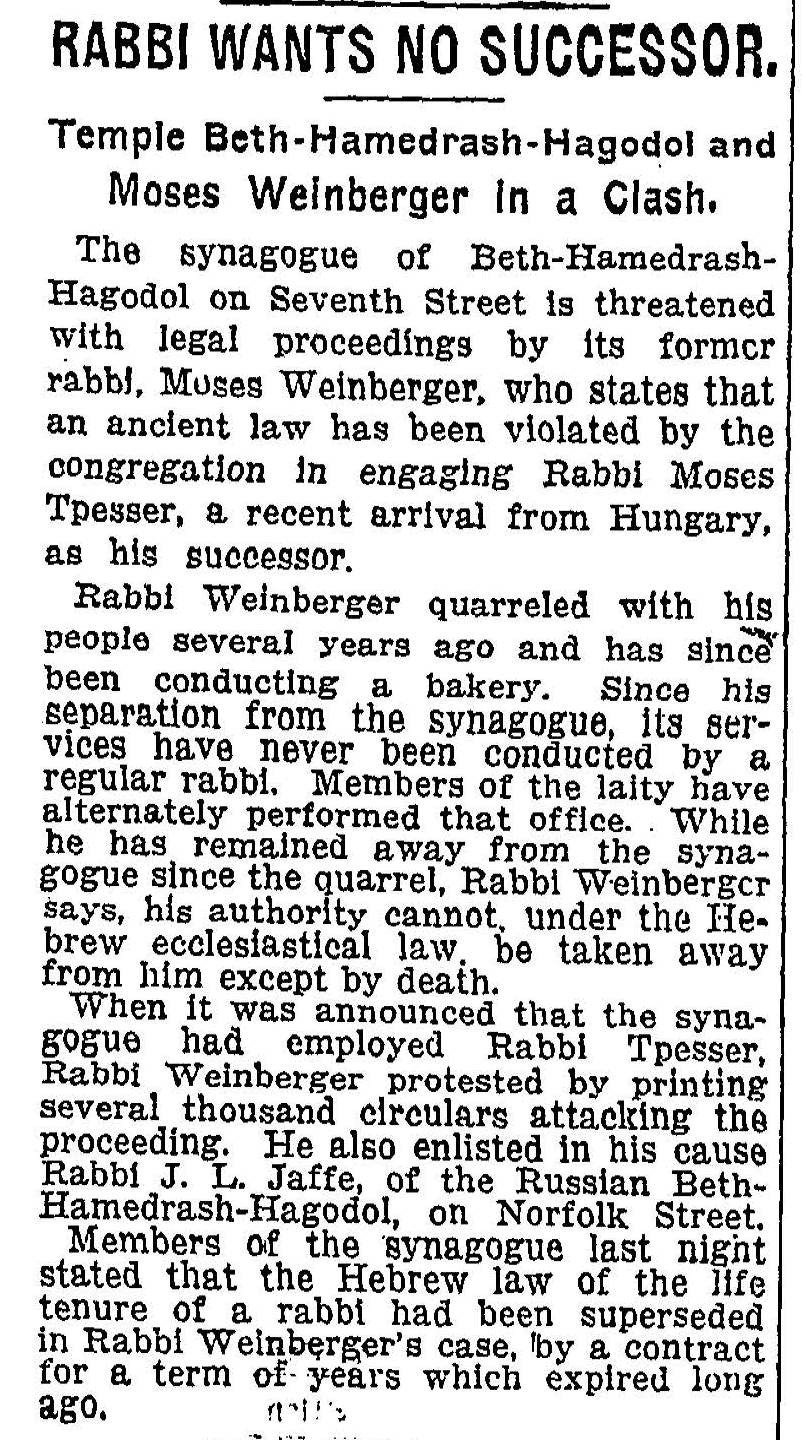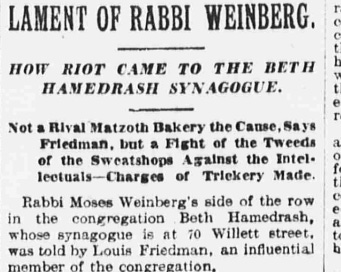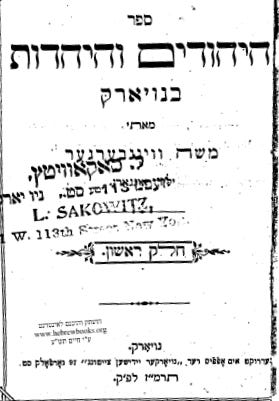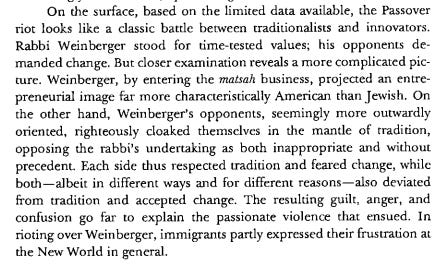From the New York Sun, April 18, 1906: 1
It isn’t clear exactly what happened. The article says that the trouble was caused by Rabbi Weinberg opening a competing matzah factory, and the congregation thought that was ‘undignified.’ But a few days later, on April 22, the Sun ran a follow up report which presented Rabbi Weinberg’s side of the story:
Basically, the shul was founded in 1883. Everything was fine until a bunch of young bums showed up and started causing all sorts of trouble. They even concocted some sort of scheme where they sold the shul and pretended to purchase some non-existent property. Apparently, that was intended as a way to get rid of Rabbi Weinberger- on the theory that if they didn’t have a shul building they didn’t need a rav. Or something. I honestly don’t understand why they needed to come up with such a convoluted scheme.
Professor Shnayer Leiman gives a timeline of what followed: 2
Weinberger stormed out of the synagogue in 1906 and was never allowed to return. Despite his ban on anyone who would succeed to his pulpit, Weinberger was succeeded officially by Rabbi Alter Shaul Pfeffer, who served as rabbi of Congregation Bet Medrash ha-Gadol Anshei Ungarn from 1912 until his death in 1936
As you can see below, Rabbi Weinberger was quite unhappy, and he apparently threatened ‘legal proceedings’ against his (former) shul. I assume that means in beis din, but I suppose it could also refer to a lawsuit of some sort. Regardless, I’m not sure why he cared whether someone took over the position; he doesn’t seem to have wanted it either way.

So what was the fight about?
Back in, 1887 Rabbi Weinberger had written a book about Judaism in New York City. 3
Professor Jonathan Sarna translated it and wrote an introduction with some biographical material about Rabbi Weinberger 4 He has this to say about the matzah riot:
I hope to come back to this point, but let’s move along for now.
R Pffefer was a world-renowned talmid chacham and expert on Gittin. Here’s an obituary for him:
Here is the title page of his teshuvos:
And here is a fascinating teshuva about how to properly transliterate certain english names into Hebrew. The problem was caused by the letter J. Apparently, depending on where certain Rabbanim came from in Europe- specifically whether they had a ‘zh’ sound in their native language, they either transliterated it as ‘דז’ or ‘דזש.’ Now this wouldn’t be that big of a deal, except that when you write a gett, you need to write all nicknames of the parties involved. So how to transliterate names like ‘Jake’ became a very big deal.
While on the topic of how of transliterating english, R Pffefer adds that if a letter is silent in english, it doesn’t get transliterated at all:
Anyhow, Substack is telling me I’m almost at my email limit, so that’ll be all for now.
Available here: https://tile.loc.gov/storage-services/service/ndnp/nn/batch_nn_goodman2_ver01/data/sn83030272/100481236/1906041801/0841.pdf
I found the newspaper clippings via Ivelt, which is a delightful yiddish language forum. I was researching someone else entirely, but I came across this feud and ended up getting sucked into the drama. This is the thread devoted to R Weinberger: https://www.ivelt.com/forum/viewtopic.php?t=12104 And this is the one devoted to R Pffeffer: https://www.ivelt.com/forum/viewtopic.php?t=8357
http://w.leimanlibrary.com/texts_of_publications/54.%20Yeshivat%20Or%20ha-Hayyim%20The%20First%20Talmudical%20Seminary%20in%20America.pdf
Available from Hebrewbooks here: If you read rabbinic Hebrew, it’s really worth reading the original. The sarcasm doesn’t quite translate into english. Otherwise the Sarna translation is excellent. Additionally, Sarna fills in many details, and in a few cases where R Weinberger only included the first initial of a person or institution, Sarna fills in the full name in brackets.
https://www.academia.edu/37929131/_People_Walk_on_Their_Heads_Moses_Weinberger_s_Jews_and_Judaism_in_New_York_trans_and_ed_Jonathan_D_Sarna_New_York_Holmes_and_Meier_1982_ Page 25














In the first clipping and paragraphs hes Weinberg, in the second erz gevorn Weinberger. Iceberg, Goldberg?